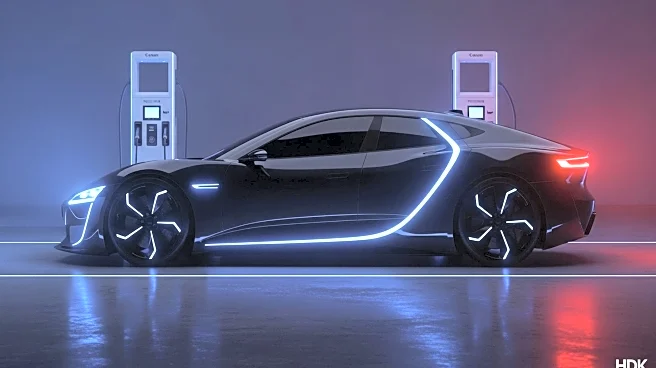What is the story about?
What's Happening?
Mercedes-Benz is set to launch the first fully electric version of its popular GLC SUV in the U.S. market, marking a significant shift towards electric vehicles. The new GLC with EQ Technology is designed to compete with other compact electric SUVs such as the Audi Q6, Porsche Macan, and BMW iX3. This model features a powerful lithium-ion battery pack with a capacity of 94.0 kilowatt-hours, delivering up to 483 horsepower. It boasts an impressive range of 443 miles on the European WLTP cycle, although this may be lower under EPA testing. The electric GLC includes advanced technology such as a massive Hyperscreen and driver assistance features, along with a unique design featuring an illuminated grille. The vehicle is expected to go on sale in the U.S. in the second half of 2026, with pricing slightly above the standard gas-powered GLC, which starts at $50,800 for the 2026 model year.
Why It's Important?
The introduction of the electric GLC by Mercedes-Benz represents a strategic move to capture a growing segment of the automotive market focused on sustainability and innovation. As consumers increasingly demand environmentally friendly options, Mercedes-Benz's entry into the electric SUV market could enhance its competitive edge against rivals like Audi, BMW, and Porsche. This development is significant for the U.S. automotive industry, as it reflects broader trends towards electrification and technological advancement. The electric GLC's features, such as its extended range and advanced driver assistance systems, may appeal to tech-savvy consumers and those prioritizing eco-friendly transportation. The shift towards electric vehicles also aligns with global efforts to reduce carbon emissions and promote sustainable energy solutions.
What's Next?
Mercedes-Benz plans to release the electric GLC in the U.S. market in the latter half of 2026. As the launch date approaches, the company may engage in marketing campaigns to highlight the vehicle's unique features and competitive advantages. Industry stakeholders, including competitors and environmental groups, will likely monitor the vehicle's performance and consumer reception closely. The success of the electric GLC could influence Mercedes-Benz's future product strategies and investments in electric vehicle technology. Additionally, regulatory developments related to emissions and electric vehicle incentives may impact the market dynamics and consumer adoption rates.
Beyond the Headlines
The introduction of the electric GLC may have broader implications for the automotive industry, including potential shifts in consumer preferences and manufacturing practices. As electric vehicles become more mainstream, traditional automakers may need to adapt their production processes and supply chains to accommodate new technologies and materials. The emphasis on sustainability and innovation could also drive collaborations between automakers and tech companies, fostering advancements in areas such as battery technology and autonomous driving. Furthermore, the electric GLC's design and features may set new standards for luxury electric vehicles, influencing future models and consumer expectations.















